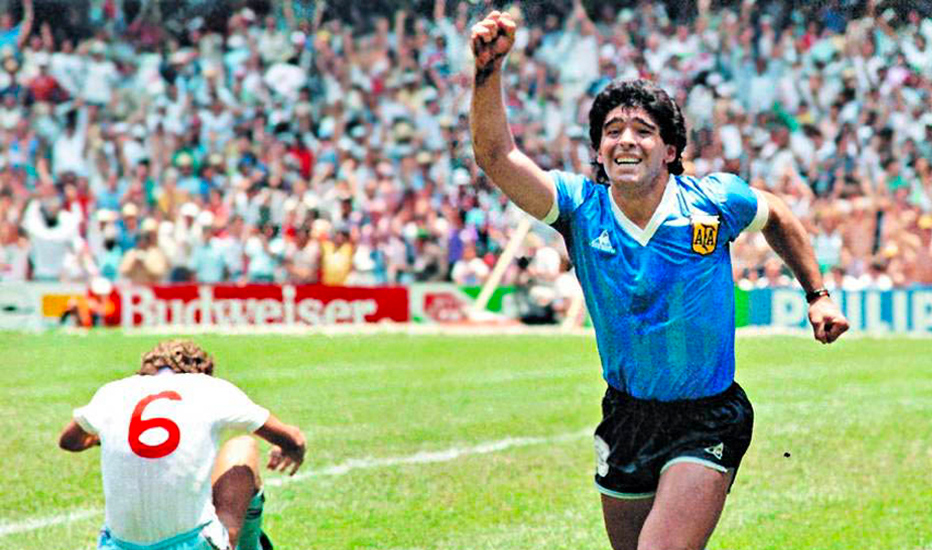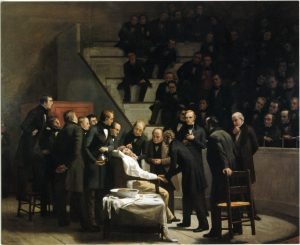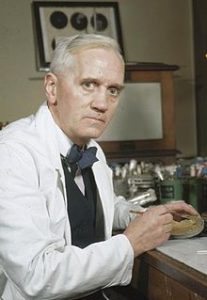Born and raised in Buenos Aires, Argentina, on October 30, 1961, Diego Armando Maradona began his football career at the age of nine and played for Argentinos Juniors’ youth team, “Los Cebollitas” or “The Little Onions,” which he carried into a 136 consecutive win steak. Known for his incredible speed and control of the football, Maradona quickly earned a positive reputation and was quickly promoted to the first team created by Argentinos Juniors at the age of fourteen. Ultimately, it only took him a single year to make his first professional debut at the age fifteen. After four months of stunning a whole country, Maradona was called up to the Argentinian national team and became the youngest Argentine to ever debut, being only sisteen years of age at the time.1 Due to his high performance in Argentinos Juniors, including 116 goals in 167 games, he was signed by the most dominating side in Argentina, Boca Juniors. After years of impressive numbers in the first division in Argentina, Maradona migrated to Europe to showcase his talents in the big leagues. Maradona rapidly earned a positive reputation while playing overseas and captivated football fans, some of whom would later consider him to be the best footballer on the planet, higher than even the Brazilian legend, Pele.2 He went on to sign for FC Barcelona the year after signing to Boca Juniors to test his luck on European soil. While at Barcelona, Maradona shocked the world by delivering unthinkable skills and goals, but there was only one issue: Maradona did not have a good relationship with the appointed president of FC Barcelona, Nunez, who proceeded to sell Diego to Napoli in 1984. To many, Napoli was a set back for Maradona’s career, but the talented footballer went on to carry this new Italian team to great heights by giving the team an identity and earning positive reputation for himself.3

After Maradona—and, indeed, the nation of Argentina itself—suffered a moral setback in the 1982 World Cup for their failure to advance to the knock-out stages, revenge was around the corner as the whole country was eager and had high hopes for the team that had arguably the greatest player alive in their squad. As a result of their belief, July 22, 1986 became the date and the setting that would be celebrated by many, agonized over by others, but remembered by all. The time was 12:00 PM in Estadio Azteca, Mexico City. The 1986 World Cup Quarter Finals featured international giants England and Argentina, and high expectations were set since both of these teams had world-class squads, with players such as Gary Lineker and John Barnes representing England, and Jorge Burruchaga and Diego Armando Maradona backing up Argentina. It was more than obvious that it was going to be a game remembered by the world of football regardless of who was crowned winner in the end.4
The whistle blew and kickoff was underway. Maradona, Captain of the Argentinian national team, knew that he had the responsibility and obligation to deliver throughout the world cup. The first half was an even matchup between both sides, and although Argentina had more possession of the football than England, there were a considerable number of chances that were not properly taken, and therefore no goals were made. Having Maradona on the Argentinian side was an apparent advantage because even though neither side scored in the first half, it was Maradona that often gave signs of real danger to the opposing team. Many knew what Maradona was capable of, but they never imagined the type of performance he was going to give, especially on the biggest stage of them all with all of the pressure and responsibility that came with being the captain of a nation that breathes football.
Argentina’s great superiority would be introduced in the second half. An inspired Diego Armando Maradona was poised to unleash his talents in order to change football history forever. In the 50th minute of the match, the football was in Maradona’s possession and the Argentinian genius showed his skill by passing up Glenn Hoddle, squeezing through two more English footballers and passing the ball to his teammate Valdano, who was beaten by another Englishman. However, the Englishman poorly cleared the ball, resulting in a perfect cross to Maradona, who, noticing he did not have enough height to head the ball in, appropriately used his hand to punch the ball in, beating the English keeper Shilton. It was a clear hand ball, which occurs when a player other than the goalkeeper deliberately handles the ball while still in play; but the referee did not see it and gave the goal to Argentina. Eventually, it became known as “The Hand Of God,” because many believed that it was God who put the ball into the net and gave Argentina the goal. Maradona was later questioned about this incident, and about the popular name that was given to the goal in an interview, where he responded by saying “Of course, it was not the hand of God. It was me. A lot goes on in a game, and I am cunning. I know what I have to do, and that time I was very lucky.”5 While many protests by the English side were received, nobody saw the controversy apparent in the incident, at least not for a while. In fact, Barry Davies, an English commentator, questioned the protests by the English side because he thought they were protesting an offside from Maradona, although they blamed the English defender, who, in their eyes, had poorly cleared the ball. “When celebrating the goal, Maradona did not show any doubt that it was a goal other than a few glances at the officials so he could sell it to them because he knew it was not valid.”


Despite the injustice done to England, the show went on. England knew they could not get distracted and quickly pressed forward to find a quick response to the inequity done to them, but an inspired Maradona was not going to let this happen. It was the 55th minute, Maradona received the football halfway through the pitch and began his sprint by taking a first touch, avoiding one opponent and rolling the ball back in order to spin it away towards the right touchline, and sped off, passing famous English footballer Peter Reid as he crossed the halfway line. As Maradona cut inside the English box, he met up with Defender Terry Butcher, who could only swing his leg in hopes that he would get the ball, ultimately failing to do so. Diego approached the box and passed Terry Fenwick, who tried fouling him, to no avail. The ball later passed English goalkeeper Shilton. This goal was, to many fans, the best goal in the history of football because of its beauty and importance. It was this goal that set a cold-blooded Maradona apart from the rest of the players in the world, as he had proved that he had the ability to carry his team to victory, a notion that also gave his teammates confidence to also perform at a greater level.6

In an attempted effort to change the result and scenario of the game, England brought in John Barnes to the war that seemed already impossible to win due to the limited amount of time left in the game and the immense amount of pressure that the English players had. Although the team only had nine minutes remaining in the match, Barnes quickly gave a cross assist to Gary Lineker, who just had to tap it in the net with his head in the 81st minute. This goal was a sign of hope for England, whose players were eager to tie the match due to the impotency and unfair nature of it. Although Lineker’s 6th goal of the competition ensured his position as top goal-scorer of the world cup, it was unfortunately not enough to avoid the defeat against the Argentinian side and Maradona. Thanks to Maradona’s “Hand Of God” play, Argentina went through to the semifinals, defeated Belgium and later wrote history when they were crowned champions of the world cup by defeating West Germany 3-2. Maradona’s legacy will live forever in the world of football, and, although it was an enormous injustice to England, it was undeniable that Maradona’s performance in this match set him apart from every footballer alive at the time, and that Argentina were worthy of coming out with the victory in the end.
- Marco Risi, Maradona, the Hand of God (Santa Monica: Xenon Pictures, 2008), 1. ↵
- Saura Bhattacharjee, “Pele vs. Maradona : A Hot Discussion on Who Was Greater of the Two,” Bleacher Report (blog), September 27, 2017, https://bleacherreport.com/articles/460039-pele-vs-maradona-a-hot-discussion-on-who-was-greater-of-the-two. ↵
- John Molinaria, “History of the World Cup: 1986 – Maradona Puts on a Show in Mexico,” Sports Net (blog), 2018, https://www.sportsnet.ca/soccer/1986-world-cup-maradona-puts-on-one-man-show/ ↵
- Peter Jardine, “Terry Butcher Still Haunted by Maradona’s Hand of God,” Daily Mail Online (blog), November 18, 2008, https://www.dailymail.co.uk/sport/football/article-1086892/Terry-Butcher-haunted-Maradonas-Hand-God.html. ↵
- “Argentina’s Diego Maradona Admits That He Cheated in World Cup Match,” Los Angeles Times, November 17, 1986, https://www.latimes.com. ↵
- Chase Early, “June 22, 1986: Maradona Crushes England’s World Cup Dreams with the Hand of God Goal,” BT (blog), 2018, https://home.bt.com/news/on-this-day/june-22-1986-maradona-crushes-englands-world-cup-dreams-with-the-hand-of-god-goal-11363987776772. ↵



44 comments
Eugenio Gonzalez
Fascinating article; I was impressed with how you describe the development of the match and the ”Hand of God” goal. The match between Argentina and England in the World Cup of 1986 is one that a soccer fan can never forget. Diego Maradona gave soccer a lot of iconic moments, but the two most iconic moments in his career happened in the same match against England. It is astonishing how Diego Maradona is a significant part of the rivalry between Argentina and England.
Joshua Marroquin
Rest in peace Diego Maradona, he was a legend in the soccer industry. Since I am a fellow soccer player, I just want to say how unfair it was to the other team since most people saw him score with his hand, but the referees didn’t call nothing. I love how they described most of his soccer Carrer and the spectacular goals that he made. However, I still am amazed how he got away with this intelligent play in front of millions. I am shocked how he thought of the idea to use his hand, which no one else has ever tried before, mid game and how this one goal help them to win the game.
Tomas Salazar
First I would like to say Rest in Peace Diego Maradona, he was and will always be a legend and an icon the the game of fútbol. I genuinely enjoyed how you described Maradona’s goals. It is crazy to think how the referees at the time could have missed Maradona’s hand pushing the ball into the head. The “Hand of God” is truly an iconic moment in all of fútbol, Maradona would do anything for his country on the field. I am glad Maradona won the world cup in 1986 in Mexico, he is truly a legend.
Emilia Caballero Carmona
Hello, Leonardo Gallegos. Your article is very interesting. “The Hand of God” is impressive because being a match of such magnitude; Maradona dared to do something that no one would try. On the other hand, for the English team it was a great injustice and it was very bad that no Argentine said something, that does not take away the merit of the “genius” that Maradona made to deceive both referees.
Joshua Buske
Haven’t really been a huge soccer fan but after reading this article it’s pretty hard not to become one. Maradona was one of the special players that just knew how to play the game to a tee. He was a global phenomenon in the futbol community and he presented his skills in 1986 when him and his team played a flawless game only to come up short. Maradona had a huge impact on fans of the sport because they got to see a true talent playing the game.
Vivian Urrutia
It is incredible how Diego Maradona gave hope to an entire country with a World Cup. The “Hand of God” Is a historic moment not only for Argentina’s national team, but also a huge event in World Cups. like the author described him, Maradona was the star of the national team of Argentina scoring many goals, the “Hand of God” being the most historic of them. I was engaged by the way the author described the game, which was The World Cup final of Argentina competing with England. Even though it was an injustice to England, it became a historic moment for soccer.
Sherisa Orozco
I really enjoyed reading this article. Growing up soccer was always on the television. My grandparents were huge soccer enthusiasts. Reading and learning about how Maradona came to be known as the best soccer player in the world was very interesting to read. From the time he first started to play soccer to leading the Argentinian team to the World Cup in 2008. Although the goal set in the game known as the “Hand of God” he admitted to being wrong it showed the presence of a player Maradona was.
Juan Asfura
Its really sad we just lost the greatest player to ever play the game…Maradona had many things that were criticized by others like his drug addiction, his drinking problems, and his social life when he was a soccer player.But when he put that #10 jersey on and that captain band around his arm, he wasn’t messing around. He entered the soccer field to win and nothing else. He was a leader and a God like figure to all the population of Argentina. He was their hero, bring cups and the World Cup in 1986, bringing joy and peace for everybody. Lionel Messi the other star from Argentina is arguably as good as Maradona was, but he is always questioned since he hasn’t brought home a cup to Argentina, the closest he has got was when he lost the World Cup Final in 2014 against Germany. Unfortunately, I wasn’t able to see him play but I had the chance to see Messi. Maradona wasn’t the best person but he was a great athlete. Rest In Peace legend.
Marcus Saldana
I have been playing soccer since I was 4 years old. I love the sport with a burning passion. Maradona was a excellent player he did what every good striker should do and that is finish. Big players shine in big games and that is exactly what Maradona did. I do consider Maradona to better at soccer than Pele because Pele did not go play over seas. Imagine if West Germany and East Germany had been Germany the talent the country would have had then would be unstoppable. Great article with some Iconic pictures.
Kayla Mendez
I’ve played soccer for a majority of my life, and I can testify that the desire to win can bring out a special drive in someone, causing them to perform better than they have ever. Although this article was really well written, I simply cannot get past the hand ball that Maradona purposefully did. The fact that he admitted to doing it intentionally, and the goal wasn’t retracted, leaves me dumbfounded. However, i admire his confidence and determination to win the game, for it gave him and his teammates the upper hand.